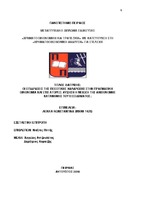Οι επιδράσεις της ποσοτικής χαλάρωσης στην πραγματική οικονομία και στις αγορές : αύξηση ή μείωση της ανισόνομης κατανομής του εισοδήματος;

Προβολή/
Λέξεις κλειδιά
Ποσοτική χαλάρωση ; Νομισματική πολιτική ; Κανάλια μετάδοσης πολιτικής ; Ανισότητα διανομής ; Εισόδημα – Πλούτος ; Monetary policy ; Policy transmission channels ; Inequality distribution ; Income - WealthΠερίληψη
Αντικείμενο της παρούσας διπλωματικής διατριβής αποτελεί η ποσοτική χαλάρωση και πώς επιδρά στη πραγματική οικονομία και στην άνιση κατανομή του εισοδήματος.
Η Ποσοτική χαλάρωση (Quantitative easing - QE) αποτελεί τη νομισματική πολιτική κατά την οποία μία κεντρική τράπεζα δημιουργεί χρήμα αγοράζοντας χρεόγραφα, όπως κρατικά ομόλογα. Σκοπός αυτού του εργαλείου είναι η αύξηση της κατανάλωσης του ιδιωτικού τομέα και η ελεγχόμενη αύξηση του πληθωρισμού, όταν πλέον δεν είναι αποτελεσματικό το μέτρο της μείωσης των επιτοκίων (όταν αυτά έχουν φτάσει κοντά στο μηδέν) με σκοπό την ανάπτυξη της οικονομίας. Αρχικά πραγματοποιείται μία ανάλυση της αγοράς των αποθεματικών στην αμερικάνικη οικονομία καθώς και οι συμβατικοί τρόποι άσκησης νομισματικής πολιτικής και οι στόχοι αυτής για την σταθερότητα των τιμών και της απασχόλησης.
Επιπρόσθετα, γίνεται αναφορά για τους μηχανισμούς μετάδοσης της νομισματικής πολιτικής στην ευρωζώνη. Στη συνέχεια, διερευνήθηκαν τα κανάλια μετάδοσης στη βάση της επίδρασης στο εισόδημα και στον πλούτο στην ευρωπαϊκή οικονομία, οι διανεμητικές επιδράσεις των περιουσιακών στοιχείων μεγάλης κλίμακας και του πληθωρισμού στην πραγματική οικονομία και στην ανισότητα εισοδήματος -πλούτου και οι αντισυμβατικές μέθοδοι νομισματικής πολιτικής.
Τα αποτελέσματα της εμπειρικής ανάλυσης υποδηλώνουν για τις Η.Π.Α. την επίδραση και τη συσχέτιση των μακροπρόθεσμων επιτοκίων, της προσφοράς του χρήματος (Μ3), και των ρευστών διαθεσίμων στην ανισότητα της διανομής εισοδήματος - πλούτου.


